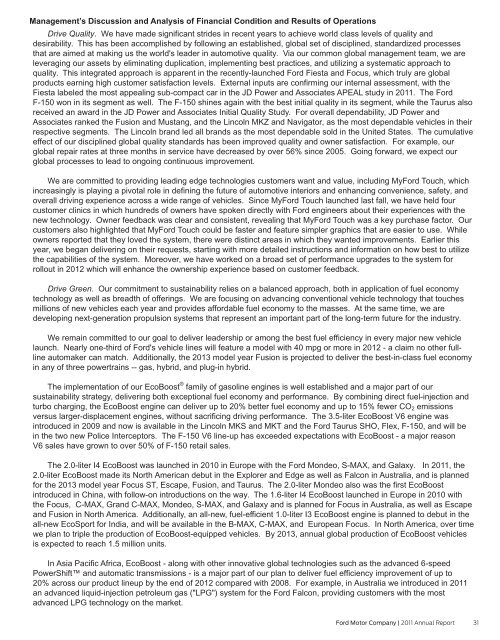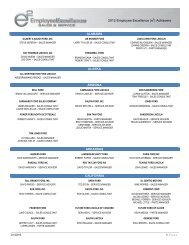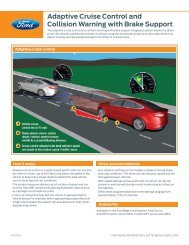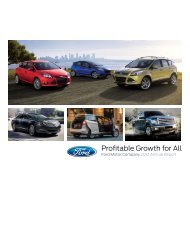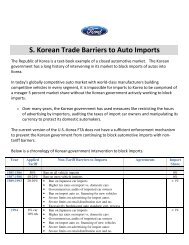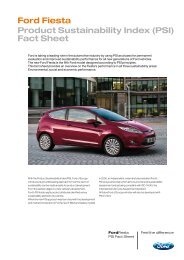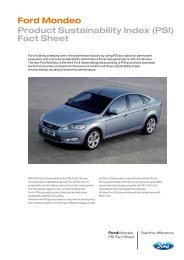Annual Report 2011 - Ford Motor Company
Annual Report 2011 - Ford Motor Company
Annual Report 2011 - Ford Motor Company
Create successful ePaper yourself
Turn your PDF publications into a flip-book with our unique Google optimized e-Paper software.
Management’s Discussion and Analysis of Financial Condition and Results of Operations<br />
Drive Quality. We have made significant strides in recent years to achieve world class levels of quality and<br />
desirability. This has been accomplished by following an established, global set of disciplined, standardized processes<br />
that are aimed at making us the world's leader in automotive quality. Via our common global management team, we are<br />
leveraging our assets by eliminating duplication, implementing best practices, and utilizing a systematic approach to<br />
quality. This integrated approach is apparent in the recently-launched <strong>Ford</strong> Fiesta and Focus, which truly are global<br />
products earning high customer satisfaction levels. External inputs are confirming our internal assessment, with the<br />
Fiesta labeled the most appealing sub-compact car in the JD Power and Associates APEAL study in <strong>2011</strong>. The <strong>Ford</strong><br />
F-150 won in its segment as well. The F-150 shines again with the best initial quality in its segment, while the Taurus also<br />
received an award in the JD Power and Associates Initial Quality Study. For overall dependability, JD Power and<br />
Associates ranked the Fusion and Mustang, and the Lincoln MKZ and Navigator, as the most dependable vehicles in their<br />
respective segments. The Lincoln brand led all brands as the most dependable sold in the United States. The cumulative<br />
effect of our disciplined global quality standards has been improved quality and owner satisfaction. For example, our<br />
global repair rates at three months in service have decreased by over 56% since 2005. Going forward, we expect our<br />
global processes to lead to ongoing continuous improvement.<br />
We are committed to providing leading edge technologies customers want and value, including My<strong>Ford</strong> Touch, which<br />
increasingly is playing a pivotal role in defining the future of automotive interiors and enhancing convenience, safety, and<br />
overall driving experience across a wide range of vehicles. Since My<strong>Ford</strong> Touch launched last fall, we have held four<br />
customer clinics in which hundreds of owners have spoken directly with <strong>Ford</strong> engineers about their experiences with the<br />
new technology. Owner feedback was clear and consistent, revealing that My<strong>Ford</strong> Touch was a key purchase factor. Our<br />
customers also highlighted that My<strong>Ford</strong> Touch could be faster and feature simpler graphics that are easier to use. While<br />
owners reported that they loved the system, there were distinct areas in which they wanted improvements. Earlier this<br />
year, we began delivering on their requests, starting with more detailed instructions and information on how best to utilize<br />
the capabilities of the system. Moreover, we have worked on a broad set of performance upgrades to the system for<br />
rollout in 2012 which will enhance the ownership experience based on customer feedback.<br />
Drive Green. Our commitment to sustainability relies on a balanced approach, both in application of fuel economy<br />
technology as well as breadth of offerings. We are focusing on advancing conventional vehicle technology that touches<br />
millions of new vehicles each year and provides affordable fuel economy to the masses. At the same time, we are<br />
developing next-generation propulsion systems that represent an important part of the long-term future for the industry.<br />
We remain committed to our goal to deliver leadership or among the best fuel efficiency in every major new vehicle<br />
launch. Nearly one-third of <strong>Ford</strong>'s vehicle lines will feature a model with 40 mpg or more in 2012 - a claim no other fullline<br />
automaker can match. Additionally, the 2013 model year Fusion is projected to deliver the best-in-class fuel economy<br />
in any of three powertrains -- gas, hybrid, and plug-in hybrid.<br />
The implementation of our EcoBoost ® family of gasoline engines is well established and a major part of our<br />
sustainability strategy, delivering both exceptional fuel economy and performance. By combining direct fuel-injection and<br />
turbo charging, the EcoBoost engine can deliver up to 20% better fuel economy and up to 15% fewer CO2 emissions<br />
versus larger-displacement engines, without sacrificing driving performance. The 3.5-liter EcoBoost V6 engine was<br />
introduced in 2009 and now is available in the Lincoln MKS and MKT and the <strong>Ford</strong> Taurus SHO, Flex, F-150, and will be<br />
in the two new Police Interceptors. The F-150 V6 line-up has exceeded expectations with EcoBoost - a major reason<br />
V6 sales have grown to over 50% of F-150 retail sales.<br />
The 2.0-liter I4 EcoBoost was launched in 2010 in Europe with the <strong>Ford</strong> Mondeo, S-MAX, and Galaxy. In <strong>2011</strong>, the<br />
2.0-liter EcoBoost made its North American debut in the Explorer and Edge as well as Falcon in Australia, and is planned<br />
for the 2013 model year Focus ST, Escape, Fusion, and Taurus. The 2.0-liter Mondeo also was the first EcoBoost<br />
introduced in China, with follow-on introductions on the way. The 1.6-liter I4 EcoBoost launched in Europe in 2010 with<br />
the Focus, C-MAX, Grand C-MAX, Mondeo, S-MAX, and Galaxy and is planned for Focus in Australia, as well as Escape<br />
and Fusion in North America. Additionally, an all-new, fuel-efficient 1.0-liter I3 EcoBoost engine is planned to debut in the<br />
all-new EcoSport for India, and will be available in the B-MAX, C-MAX, and European Focus. In North America, over time<br />
we plan to triple the production of EcoBoost-equipped vehicles. By 2013, annual global production of EcoBoost vehicles<br />
is expected to reach 1.5 million units.<br />
In Asia Pacific Africa, EcoBoost - along with other innovative global technologies such as the advanced 6-speed<br />
PowerShift and automatic transmissions - is a major part of our plan to deliver fuel efficiency improvement of up to<br />
20% across our product lineup by the end of 2012 compared with 2008. For example, in Australia we introduced in <strong>2011</strong><br />
an advanced liquid-injection petroleum gas ("LPG") system for the <strong>Ford</strong> Falcon, providing customers with the most<br />
advanced LPG technology on the market.<br />
<strong>Ford</strong> <strong>Motor</strong> <strong>Company</strong> | <strong>2011</strong> <strong>Annual</strong> <strong>Report</strong> 31


